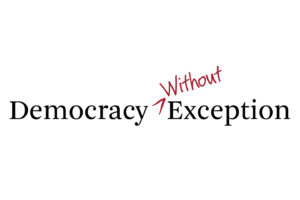
Sixty percent of Americans say the president should not ignore the courts. This belief crosses party lines: eighty-six percent of Democrats, fifty-two percent of independents, and more than one third of Republicans agree.
This is one of several findings from a national survey of 2,000 Americans that Public Agenda and the SNF Agora Institute at Johns Hopkins University conducted, in partnership with YouGov, in early May 2025. The research explores how Americans perceive their democracy and what they expect from it.
At a time when partisan conflict overshadows shared values, the data show many Americans still believe power should have boundaries and that no one, not even the president, stands above the law. They trust the rule of law, expect the limits of power to be respected, and rely on public institutions designed to contain overreach.
Sarah Bryner, Director at Public Agenda, sees these beliefs as a sign of democratic health. “What we’re seeing from Americans now, despite some contradictions, is a vindication of the rule of law in the federal government,” she said. “Americans see compromise and the separation of powers as critical for American institutions to function.”
The numbers support that view. Nearly seventy percent of Americans reject the idea of changing the Constitution to allow a president to run for a third term. Fifty-eight percent oppose impeaching judges who rule against the executive branch. These opinions draw a line between disagreement and dismantling. Most Americans still want that line to stay in place.
Yet, while many Americans still support the structures of democracy, their trust in one another is thinning. Sixty-one percent say politicians should work across the aisle, even at the cost of some priorities. But fewer see those on the other side as worthy partners. Among baby boomers, seventy percent call the opposing party evil; forty-seven percent of Gen Z shares this sentiment.
Scott Warren, a Fellow at the SNF Agora Institute and co-lead on the research, said, “We’ve been measuring this statistic at SNF Agora for a while, and it’s getting worse. Maybe this isn’t completely surprising in the current context, but it is concerning.”
Public Agenda’s framing helps explain the generational divide. Younger Americans may feel more open to opposing views and less tied to political parties. Their skepticism toward organizing institutions like political parties, which can have the effect of sorting people into partisan groups, may leave them less likely to demonize fellow citizens. “Gen Z seems to have higher levels of tolerance toward both people and alternative explanations of the world,” Bryner said.
This tension gives our current democracy its shape: a shared space stretched by disagreement. Americans stand behind institutions, but trust between individuals is wearing down. The impulse to compromise remains, pressed against a rising tide of resentment.
While some Americans put partisan values above all else, Warren believes there is room for repair. “A good percentage of Republicans value principles above party,” he offered as an example. “We’ve been working to support these conservatives and ensure they have the communications, political, and moral backing to lead from within.” He emphasized that the broader pro-democracy community needs to listen to how conservatives are navigating this moment and to work in ways that build trust rather than deepen division.
That distinction matters because, even as polarization grows louder, a quieter group continues to carry the frame. They may not dominate headlines, but they help keep the house from collapsing. “This research reinforces the idea that Americans still believe in democracy,” Warren said. “Now, we must meet the moment by building stronger institutions and habits of civic life.”
That work happens in dusty school board meetings and crowded city council chambers, in libraries with sticky tables, and in church basements with folding chairs. In courtrooms, classrooms, backyard barbecues, and block parties. The habits of democracy do not begin in Washington. They begin wherever people who differ from one another decide to sit down, stay, and share their thoughts.
The survey does not offer easy solutions. It reveals what Americans still choose to protect: courts that remain independent, limits that check power, and the persistent hope that inclusive governance remains possible. This framework is not an exercise in idealism. It is a scaffold. And for now, it remains intact.
For more information about this survey, click here.

